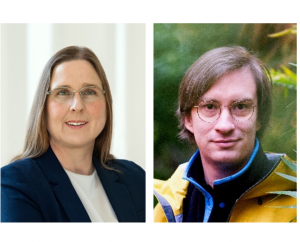
Prof. Dr. Jennifer Strunk and Prof. Dr. Helge Stein
We are very pleased to welcome two new members to the e-conversion Cluster of Excellence: Prof. Jennifer Strunk and Prof. Dr. Helge Stein.
Prof. Dr. Jennifer Strunk (*1980) received the W3 professorship for “Industrial Chemistry and Heterogeneous Catalysis” at TUM in June 2023. She does research in the fields of heterogeneous catalysis and photocatalysis. The goal is the activation of small stable molecules, such as the recycling of the greenhouse gas carbon dioxide into chemical production and the activation of nitrogen for the synthesis of basic chemicals. In particular, the focus is on understanding the light- and heat-driven physical and chemical elementary steps to enable scaling up from the laboratory to industrial scale.
Prof. Dr. Jennifer Strunk received her diploma (2004) and PhD (2008) in Technical Chemistry at the Ruhr-University Bochum. After a postdoctoral period at UC Berkeley (2008-2010), she became a junior research group leader at Ruhr-Universität (2010-2014). She was an independent group leader at the MPI for Chemical Energy Conversion (2014-2016) and W2 professor at the Leibniz Institute for Catalysis at the University of Rostock (2017-2023). Prof. Dr. Jennifer Strunk received, among others, the Lecturer Award of the Chemical Industry Fund (2017) and the Jochen Block Award of the German Catalysis Society (2014).
Prof. Dr. Helge Stein has been named to the professorship of Digital Catalysis at TUM in 2023. He develops experimental and computational methods for accelerated discovery, characterization and upscaling of new improved materials in catalysis and for secondary batteries. Experimental data are collected using self-developed robots, planned and evaluated using algorithms and machine learning, and stored in a semantically searchable manner via data management. The goal is to build a global decentralized material acceleration platform (MAP).
Prof. Dr. Helge Stein studied physics at Georg-August-Universität Göttingen from 2008 to 2013 and received his PhD summa cum laude on high-throughput methods at Ruhr-Universität Bochum for mechanical engineering in 2017. From 2017 until he took up his tenure track professorship for Applied Electrochemistry at the Karlsruhe Institute of Technology in 2020, he conducted research at the California Institute of Technology (Caltech).
